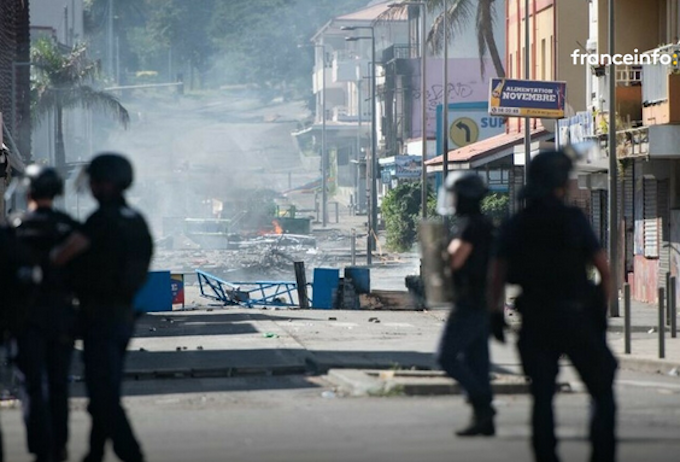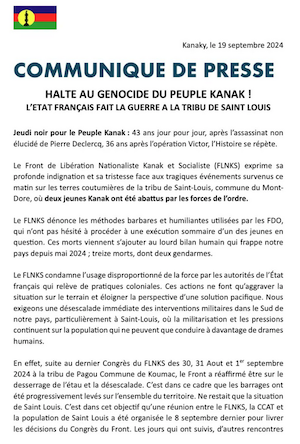
By Stefan Armbruster and Harry Pearl of BenarNews
French police have shot and killed two men in New Caledonia, stoking tensions with pro-independence groups days ahead of a public holiday marking France’s annexation of the Pacific archipelago.
The pro-independence FLNKS (Kanak and Socialist National Liberation Front) decried the deaths yesterday as “barbaric and humiliating methods” used by French police resulting in a “summary execution” and called for an independent investigation.
The shootings bring the number of deaths in the Pacific territory to 13 since unrest began in May over French government changes to a voting law that indigenous Kanak people feared would compromise their push for independence.
- READ MORE: France boosts Pacific security forces as symbolic ‘September 24’ date looms
- Other Kanaky New Caledonia crisis reports
The men were killed in a confrontation between French gendarmerie and Kanak protesters in the tribal village of Saint Louis, a heartland of the independence movement near the capital Nouméa.
Public Prosecutor Yves Dupas said in a media statement the police operation using armoured vehicles was to arrest suspects for attempted murder of officers and for armed robbery on the Saint Louis road, with “nearly 300 shots noted in recent months.”
“The two deceased persons were the subject of a search warrant, among a total of 13 persons implicated, sought and located in the Saint Louis tribe,” Dupas said, adding they had failed to respond to summonses.
Dupas ordered two investigations, one over the attempted murders of police officers and the second into “death without the intention of causing it relating to the use of weapons by the GIGN gendarmerie (elite police tactical unit) and the consequent death of the two persons sought”.
Push back ‘peaceful solution’
Union Calédonienne (UC) secretary-general Dominique Fochi said yesterday the actions of French security forces “only worsen the situation on the ground and push back the prospect of a peaceful solution.”

“The FLNKS denounces the barbaric and humiliating methods used by the police, who did not hesitate to carry out a summary execution of one of the young people in question,” Fochi read from a FLNKS statement at a press conference.

“We demand an immediate de-escalation of military interventions in the south of our country, particularly in Saint Louis, where militarisation and pressure continue on the population, which can only lead to more human drama.”
The statement called for an immediate “independent and impartial investigation to shed light on the circumstances of these assassinations in order to establish responsibilities”.
Prosecutor Dupas said police came under fire from up to five people during the operation in Saint Louis and responded with two shots.
“The first shot from the policeman hit a man, aged 30, positioned as a lone sniper, who was wounded in the right flank. The second shot hit a 29-year-old man in the chest,” Dupas said, adding three rifles and ammunition had been seized.
One of the men died at the scene, while the other escaped and later died after arriving at a local hospital.
Kanaky-Nouvelle-Calédonie : Une colonie française 🇳🇨
Samir vous raconte l’histoire de la résistance kanak et vous explique pourquoi la France veut absolument garder la main sur cet archipel !
⏬ La vidéo ⏬ pic.twitter.com/gPCZFmlCGH
— Paroles d’Honneur (@ParolesDHonneur) September 18, 2024
Deaths raise Citizenship Day tensions
The deaths are likely to raise tensions ahead of Citizenship Day on Tuesday, which will mark the 171st anniversary of France’s takeover of New Caledonia.
For many Kanaks, the anniversary is a reminder of France’s brutal colonisation of the archipelago that is located roughly halfway between Australia and Fiji.
Paris has beefed up security ahead of Citizenship Day, with High Commissioner Louis Le Franc saying nearly 7000 French soldiers, police and gendarmes are now in New Caledonia.
“I have requested reinforcements, which have been granted,” he told local station Radio Rythme Bleu last week.
“This has never been seen before, even during the toughest times of the events in 1984 and 1988 — we have never had this,” he said, referring to a Kanak revolt in the 1980s that only ended with the promise of an independence referendum.
Authorities have also imposed a strict curfew from 6 pm to 6 am between September 21-24, restricted alcohol sales, the transport of fuel and possession of firearms.
Kanaks make up about 40 percent of New Caledonia’s 270,000 people but are marginalised in their own land — they have lower incomes and poorer health outcomes than Europeans who make up a third of the population and occupy most positions of power in the territory.
UN decolonisation process
New Caledonia voted by modest majorities to remain part of France in referendums held in 2018 and 2020 under a UN-mandated decolonisation process. Three votes were part of the Noumea Accord to increase Kanaks’ political power following deadly violence in the 1980s.
A contentious final referendum in 2021 was overwhelmingly in favour of continuing with the status quo.
However, supporters of independence have rejected its legitimacy due to very low turnout — it was boycotted by the independence movement — and because it was held during a serious phase of the covid-19 pandemic, which restricted campaigning.
Earlier this year, the president of Union Calédonienne proposed Septemnber 24 as the date by which sovereignty should be declared from France. The party later revised the date to 2025, but the comments underscored how self-determination is firmly in the minds of local independence leaders.
The unrest that erupted in May was the worst outbreak of violence in decades and has left the New Caledonian economy on the brink of collapse, with damages estimated to be at least 1.2 billion euros (US $1.3 billion).
Some 35,000 people are out of a job.
Copyright ©2015-2024, BenarNews. Republished with the permission of BenarNews.









































